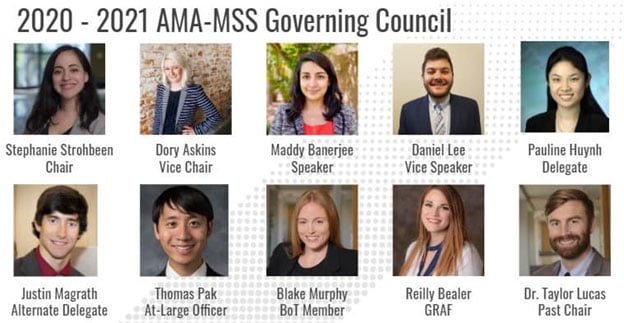Spring Updates from the American Medical Association
Matthew J. Christensen, MS4, Chicago Medical School
ACEP/EMRA Primary Delegate to the AMA-MSS
Alysa F. Edwards, MS3, University of Colorado School of Medicine
ACEP/EMRA Alternate Delegate to the AMA-MSS
While the healthcare landscape seemed to be turned on its head during the Coronavirus Disease 2019 (COVID-19) pandemic, the American Medical Association (AMA) and its Medical Student Section (MSS) have worked diligently to find novel ways to effectively address such a dynamic climate. The AMA has produced dozens of guidance statements, issued influential letters to members of Congress and other governing bodies, delivered expert testimony through news interviews and video updates, while also directly providing thoughtful, valuable resources directly aimed at a wide range of communities including medical students and the emergency medicine specialty. Read on for a summary of key actions, the virtual MSS Annual Assembly 2020, as well as links you may follow to learn more.
Key AMA Actions During the COVID-19 Pandemic
Since early March, the AMA has repeatedly advocated for health care workers, students, and vulnerable members of our community. Most recently, AMA President Dr. Patrice A. Harris, MD, MA and Chair of the Board of Trustees Dr. Jesse Ehrenfeld, MD, MPH released a statement in opposition to police brutality and racism which recognizes violence between law enforcement officers and Black and Brown communities as a “critical determinant of health.” The statement urges transparency and accountability in officer-related deaths, broad institutional opposition to police violence, consideration of healthcare and hospital policies regarding law enforcement offices, and increased uniform training as well as further research on the subject. The AMA has also developed the Prioritizing Equity video series to discuss how physicians can support the cause, learning to recognize, address, and name inequity and systemic racism.
The AMA has also been vocally advocating for students during the COVID-19 pandemic, creating a comprehensive COVID-19 Medical Student Guidance webpage where students can view AMA-published articles and statements catered specifically to their needs. The AMA has urged schools and health systems to responsibly engage medical students through changes in graduation and licensing requirements while continually calling for adequate provision of PPE, testing, and financial resources for students who may be exposed or infected as a result of school-sanctioned activities. In light of the nearly universal cancellation of graduation celebrations across the country, the AMA hosted a Tribute to the Medical School Class of 2020 featuring Dr. Anthony Fauci, Dr. Atul Gawande, Dr. Ken Jeong, Dr. Meredith Grey (Ellen Pompeo), and the (virtually) reunited cast of Scrubs, alongside other medical professionals and celebrities offering their gratitude, respect, and appreciation towards the rising class of residency interns.
Considering the effects of COVID-19 on our health system, the AMA has been at the forefront in the drive to secure more PPE and protect frontline workers physically, mentally, and financially. The AMA has advocated for efforts that protect the supply of supportive controlled substances used to ventilate patients safely while also calling for expanded telehealth coverage for emergency department (ED) visits. While there are many more timely policy actions and statements made by the AMA during the COVID-19 pandemic, you are welcome to read more through the AMA’s collection of Press Release Statements, COVID-19 News page, and COVID-19 Physician Resource Center.
AMA Medical Student Section Virtual Assembly Summary
The AMA-MSS Annual Assembly went virtual this year, held via video conference call on June 6, 2020 following guidance from the AMA Board of Trustees and recognition of the nearly universal limitations of public gatherings across the country. The primary materials for the assembly may be found on the AMA-MSS Annual Meeting 2020 webpage. The agenda for this unique meeting featured educational programming from the Minority Issues Committee (MIC), Committee on Medical Education (CME), and Committee on Bioethics and Humanities (CBH), along with elections for six national student leadership positions on the AMA-MSS Governing Council. These leadership positions included Speaker, Vice Speaker, Vice Chair, Primary Delegate to the House of Delegates (HOD), Alternate Delegate to the HOD, and At-Large Officer.
The Assembly opened with acknowledgement of current events and the injustice surrounding recent acts of racism and police brutality across the United States, featuring a poignant video tribute created by the MIC coupled with statements from the current AMA-MSS Speaker, Vice Speaker, outgoing Chair of the AMA-MSS Governing Council (GC), and outgoing student member of the AMA Board of Trustees (BOT). Next, the outgoing MSS GC Chair and outgoing BOT student member each delivered their final address to the virtual delegation, highlighting the accomplishments achieved during their terms and reaffirming their dedication to fight inequity across the healthcare system.
At the conclusion of these remarks, the virtual elections began and the ballot remained open through the duration of the three educational programming sessions. The first session, organized by CBH, discussed the importance of situational awareness and accountability in the age of misinformation. This was followed by a discussion led by CME leadership outlining the drastic changes to medical education both on an institutional and national level in the face of the pandemic. The final educational session was an insightful discussion of health disparities organized by MIC leadership, featuring Group Vice President and Chief Health Equity Officer of the AMA Dr. Aletha Maybank, MD, MPH. Case studies of an African American patient and a member of the Navajo Nation were each discussed to highlight the history of inequity, lack of trust, and cultural insensitivity experienced by these marginalized minority groups while navigating the healthcare system, sharing insight and resources to help the next generation of physicians address these obstacles as we begin our own medical careers. The guest speaker of the first session requested that the talk not be recorded, but recordings of the second and third programming sessions will be made available through the AMA-MSS Governing Council.
At the conclusion of the virtual assembly, election results were announced. The 2020-21 AMA-MSS Governing Council will be led by:
- Chair - Stephanie Strohbeen
- *Vice Chair - Dory Askins
- *Speaker - Maddy Banerjee
- *Vice Speaker - Daniel Lee
- *Delegate to the HOD - Pauline Huynh
- *Alternate Delegate to the HOD - Justin Magrath
- *At-Large Officer - Thomas Pak
- Board of Trustees Student Member - Blake Murphy
- Government Relations Advocacy Fellow - Reilly Bealer
- Immediate Past Chair - Dr. Taylor Lucas
*elected during the virtual AMA-MSS Annual Assembly 2020

With this unprecedented assembly season coming to a close, your EMRA/ACEP Primary and Alternate Delegates to the AMA-MSS remain committed to keeping you informed while advocating on behalf of medical students and the emergency medicine specialty. Questions and comments related to the AMA Medical Student Section may be sent to EMRA’s Primary and Alternate AMA-MSS Delegates at MSCAMA1@emra.org and MSCAMA2@emra.org. You may also engage with the national AMA-MSS delegation through the AMA Med Students Facebook page.
Related Content

Jun 25, 2020
Program Director Interview Series: Radosveta Wells, MD | EM Residency Program Director at Texas Tech University Health Sciences Center El Paso, El Paso, TX
In this installment of the Program Director Interview Series we sit down with Radosveta Wells, MD to learn about the EM Residency at Texas Tech University Health Sciences Center El Paso.






